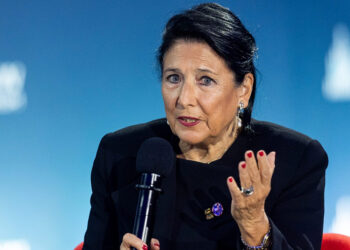Following in the electoral footsteps of Europe, a coalition rule has lately been thought up in Sakartvelo as the most optimal way to manage the country, an assumption embedded in the theoretical depths, as well as on the practical surface of the political opposition to the party in charge (the latter usually refraining from commenting on any coalition prospects). Sakartvelo has not been ruled in the recent past by a coalition government, so we are not very much used to a state governing style, based on which several political forces acquire the voter’s mandate to create a government, who are prepared to collaborate to lead the nation together in good will.
Following the soviet collapse, it so happened that every dominant political force has come to power with absolute majority to single-handedly take care of the governed who elected them to govern. Now that Georgia’s electoral system has finally dropped majoritarianism, and has turned to a fully proportional representation system, the likelihood of achieving a coalition type of rule is a tangible probability, though, as said, the idea is nursed by the opposition more enthusiastically than by the incumbent government.
This clearly emphasizes the confidence of the current decision makers about their winning the upcoming elections with an absolute majority, once again. The pre-electoral attitude of the opposition, however, is “don’t count your chickens before they hatch.” Indeed, this is the main political overtone we hear day and night on the already excited and roaring media waves of the country, which exude the hope that a coalition government will work as an actual panacea to cure the nation of all its faults and vices.
Incidentally, this could be true, because the overall belief within the realm of political science is that it is coalition-style rule that has the resources to pull a nation out of political strife and economic crisis, giving the potential government a considerable amount of political acceptability and multiparty identity.
Georgia is a typical multi-party state, a fact which, in our political reality, does not lend itself to the creation of a good basis for a multi-party coalitional system of administration. After all, a coalition government purports to be nothing more than an arrangement, agreed upon by the political forces who have received the consent of the electorate to rule the nation, based on common cause and mutual interests within the forthcoming cabinet of ministers, to do its possible best to be productive. As simple as that!
Indeed, it needs to be clarified if the extant Georgian political spectrum is ready and qualified enough to function within the frames of collective political rule, seeing as our experience of coalitions is practically nonexistent. It is more than conceivable that the coalition government, if it ever comes into force in Georgia, will represent yet another political experiment which either fails or survives to continue work. The chances of this are probably fifty-fifty. And if the cards have it, the coalition government should at least be formed by two discrete political forces. Imagine the turmoil potentially created by those parties that get thrown overboard! In the fits of their political misfortune, they may not commit suicide, but their always-present political negativity, in such an unfortunate finale for them, might hit the fan, and this will cost us a lot.
The good news, though, might be that in the hands of a coalition government, although the answer to our problems would not be sturdy and perennial, our country will have a representative opportunity to address certain vital national issues, based on fair and unanimous beneficial solutions for our people. In a word, panacea or no panacea, the coalitional solution to the outcome of the forthcoming parliamentary election this year might very well be a curiously refreshed construction of the political process in the country.
And finally, if you find yourself interested in additional details concerning the merits and flaws of a coalition government in Georgia, we refer our reader to the issue of January 27, 2022 of this newspaper.
Op-Ed by Nugzar B. Ruhadze














